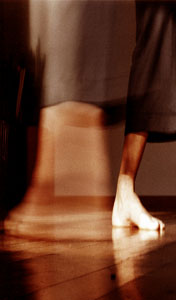What is it ?
|
Dance Movement Therapy (DMT), in the UK meanwhile called Dance Movement Psychotherapy (DMP), is a psychotherapeutic approach which belongs to the group of the arts therapies, along with music therapy, art therapy and drama therapy. DMP is based on the connection between motion and emotion and works with the body and its own language: all corporal movement can lead to changes in the psyche, promoting health and personal growth. Its' theory and method draw upon a multidisciplinary body of knowledge: it utilises psychotherapy theory and method and the investigation of non-verbal communication, developmental psychology and movement analysis systems (Kestenberg 1975, Stanton-Jones 1992). DMP employs the creative, communicative aspects of improvised movement within a structure provided by the therapist. It uses movement as a medium through which one may gain contact with the conscious and unconscious processes and emotions. Exploring gestures, postures and movement qualities, makes a personís inner world and their personal symbolism become tangible. The Dance Movement Psychotherapist creates a "holding environment" in which such feelings can be safely expressed, acknowledged and communicated. In the context of the therapeutic relationship, it can assist the client in gaining insight into how s/he builds and maintains relationships with others (Payne, 1992). |
 |